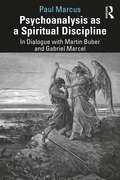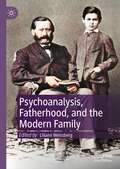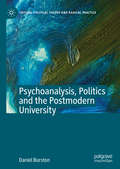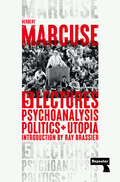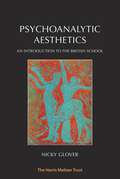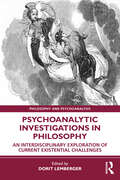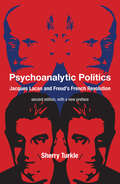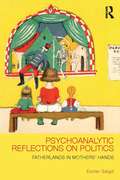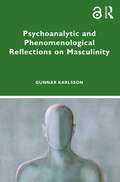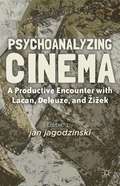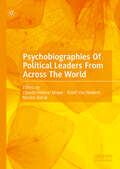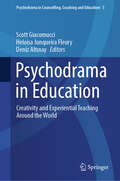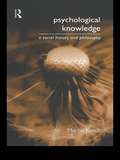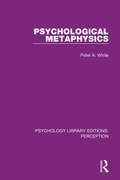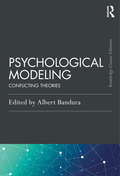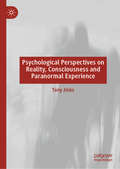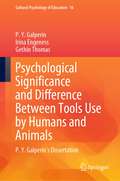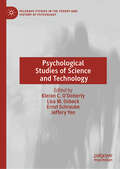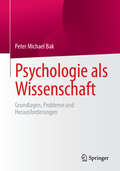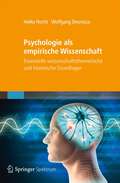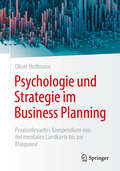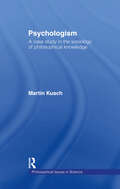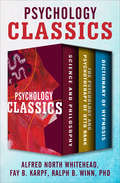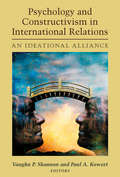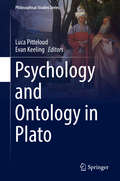- Table View
- List View
Psychoanalysis as a Spiritual Discipline: In Dialogue with Martin Buber and Gabriel Marcel
by Paul MarcusThe great existential psychiatrist Ludwig Binswanger famously pointed out to Freud that therapeutic failure could "only be understood as the result of something which could be called a deficiency of spirit." Binswanger was surprised when Freud agreed, asserting, "Yes, spirit is everything." However, spirit and the spiritual realm have largely been dropped from mainstream psychoanalytic theory and practice. This book seeks to help revitalize a culturally aging psychoanalysis that is in conceptual and clinical disarray in the marketplace of ideas and is viewed as a "theory in crisis" no longer regarded as the primary therapy for those who are suffering. The author argues that psychoanalysis and psychoanalytic psychotherapy can be reinvigorated as a discipline if it is animated by the powerfully evocative spiritual, moral, and ethical insights of two dialogical personalist religious philosophers—Martin Buber, a Jew, and Gabriel Marcel, a Catholic—who both initiated a "Copernican revolution" in human thought. In chapters that focus on love, work, faith, suffering, and clinical practice, Paul Marcus shows how the spiritual optic of Buber and Marcel can help revive and refresh psychoanalysis, and bring it back into the light by communicating its inherent vitality, power, and relevance to the mental health community and to those who seek psychoanalytic treatment.
Psychoanalysis, Fatherhood, and the Modern Family
by Liliane WeissbergTo what extent are the concepts of fatherhood and family, as proposed by Sigmund Freud, still valid?Psychoanalysis, Fatherhood, and the Modern Family traces the development of Freud’s theory of the Oedipus complex and discusses his ideas in the context of recent psychoanalytic work, new sociological data, and theoretical explorations on gender and diversity. Contributors include representatives from many academic disciplines, as well as practicing psychoanalysts who reflect on their experience with patients. Their exciting essays break new ground in defining who a father is—and what a father may be.
Psychoanalysis, Politics and the Postmodern University (Critical Political Theory and Radical Practice)
by Daniel BurstonCritical theory draws on Marxism, psychoanalysis, postmodern and poststructuralist theorists. Marxism and psychoanalysis are rooted in the Enlightenment project, while postmodernism and poststructuralism are more indebted to Nietzsche, whose philosophy is rooted in anti-Enlightenment ideas and ideals. Marxism and psychoanalysis contributed mightily to our understanding of fascism and authoritarianism, but were distorted and disfigured by authoritarian tendencies and practices in turn. This book, written for clinicians and social scientists, explores these overarching themes, focusing on the reception of Freud in America, the authoritarian personality and American politics, Lacan’s “return to Freud,” Jordan Peterson and the Crisis of the Liberal Arts, and the anti-psychiatry movement.
Psychoanalysis, Politics, and Utopia: Five Lectures
by Herbert MarcuseAn impassioned plea for overcoming capitalism, whose urgency is more timely today than when it was first published fifty years ago.Back in print after fifty years and with a new introduction by Ray Brassier, this often overlooked but prescient collection of Marcuse's lectures makes an impassioned plea for the overthrowing of capitalism.Analysing the work of Freud and Marx, and taking in topics like automation, work, postcapitalism, utopia, and technology, Psychoanalysis, Politics, and Utopia excavates the psychic roots of the current crisis of capitalist civilisation, and gives us a blueprint for the emancipation of humanity from the toils of capitalism.In a world reeling from the ongoing collapse of the neoliberal consensus, coupled with the accelerating pace of catastrophic climate change wrought by capitalism, Marcuse&’s radical insights in Psychoanalysis, Politics, and Utopia are as urgently relevant today as they were in 1970.
Psychoanalytic Aesthetics: An Introduction to the British School
by Nicky GloverThis is a book to which the attention of students of art theory and criticism, and all those interested in the important application of psychoanalysis to other fields of study, should be drawn. Psychoanalytic Aesthetics rethinks the classical account of the relation between art and madness, creativity and psychoneurosis, and the distinction between the primary and secondary processes. It covers a great deal of ground and reviews many psychoanalytic writers (predominantly of the British tradition) on aesthetics, as well as many of the aestheticians using a psychoanalytic background. It is well written and there is an impressive grasp of the many writers covered. More than this, the book is also a work of psychoanalytic scholarship, being a masterly overview of psychoanalytic schools of thought, and an in-depth study of the British object-relations schools. It amply achieves its overriding goal to demonstrate that the work of the British School presents a significant contribution to psychoanalytic aesthetics and criticism, updating Freud, Kris and the classical contributions to the field. It is therefore potentially a very useful source book for future scholars of both psychoanalysis and of aesthetics.
Psychoanalytic Investigations in Philosophy: An Interdisciplinary Exploration of Current Existential Challenges (Philosophy and Psychoanalysis)
by Dorit LembergerThis pioneering volume explores and exemplifies the relevance of psychoanalysis to contemporary philosophical problems. The novelty of the book's viewpoint is the consideration of psychoanalysis as an existentialist mode of thinking that deals with current existential problems such as loneliness, uncertainty, struggling with personal tragedies and rehabilitation. Each chapter presents classic aspects of psychoanalytic theory based on Greek tragedies, as well as their similarities with interdisciplinary aspects in other areas of study like modern literature, hermeneutics, and philosophy of language. To deepen each subject, each chapter also applies an interdisciplinary methodology that illuminate previously hidden insights arising from the fusion of psychoanalysis and philosophy. Featuring contributions from well-known scholars like Professor Avi Sagi and Professor Dov Schwartz, as well as more up-and-coming writers, the book suggests possible implications of philosophical, hermeneutical, and literary theories to the perception of post-modern issues concerning agency and the subjective emotional world. Psychoanalytic Investigations in Philosophy is of great interest to scholars of psychoanalysis and hermeneutic philosophy, as well as teachers and academics who want to explore new teaching methods in various disciplines, and general-interest readers who wish to expand their horizons around concepts that can be applied to better understand themselves and the age in which we live.
Psychoanalytic Politics, second edition, with a new preface: Jacques Lacan and Freud's French Revolution
by Sherry TurkleAn updated edition of the seminal book that explores why the interest in psychoanalysis in France exploded after 1968 and what it says about culture and therapy.Among Western countries, France may well be the one that resisted Freud the longest. But, in the late 1960s, France was seized by an infatuation with Freudianism. By the end of that decade, France had more than a psychoanalytic movement: it had a widespread and deeply rooted psychoanalytic culture. At the heart of this development was Jacques Lacan's reconstruction of Freudian theory, a reinvention of psychoanalysis that resonated with French culture in the aftermath of the uprisings of 1968. In Psychoanalytic Politics, the second edition of her groundbreaking work, Sherry Turkle tells the fascinating story of Lacan and why his work so profoundly influenced the French psyche. While in the United States psychoanalysis is identified with an essentially conservative medical establishment, the French rediscovery of Freud, in a dramatic enactment of Freud&’s prophesy, became associated with the most radical elements of French philosophical and political life. In this book, Turkle provides a firsthand account of the psychoanalytic culture that developed in France—as a politicized, Gallicized, and poeticized Freudianism, deeply marked by the work of Jacques Lacan. The clearest introduction in English to Lacan's teaching, Psychoanalytic Politics explores how cultures appropriate theories of mind and how ideas come to connect with individuals. The book&’s final chapter provides a fascinating portrayal of the last years of Lacan&’s life—the intrigue and power struggles that resulted in the break-up of the Freudian School he founded and the events that unfolded in the years following his death in 1981.This edition includes a new preface by the author, reflecting on the origins of the book and its relevance for today: a time when the integration of thought and feeling, politics and self-examination is as urgent an endeavor as ever.
Psychoanalytic Reflections on Politics: Fatherlands in mothers' hands
by Eszter SalgóPsychoanalytic Reflections on Politics: Fatherlands in mothers’ hands is a playful exploration of how people’s desires, fantasies, and emotions shape political events and social phenomena. It highlights the mythical sources of today’s political projects, the power of political imagination, and the function of symbolism in political thought. Eszter Salgó argues that the driving force for the formation of political communities is fantasy – ‘illusions’ in a Winnicottian sense, ‘phantasies’ in a Lacanian sense, ‘phantoms’ as described by Nicolas Abraham and Maria Torok, and ‘dreams’ as interpreted by Sándor Ferenczi. She introduces the metaphor of the ‘fantastic family’ as a symbolic representation of political communities, both to reflect on people’s deeply felt desire to find in public life the resolution, love, and wholeness of early childhood, and to unveil the political elite’s readiness to don the mask of the ‘ideal parent’. The book is divided into two parts. The first part of the book explores the theories of Donald Winnicott and Jacques Lacan: the matrimony on the stage of politics between the ‘good-enough mother’ and the Symbolic Father which inaugurates the story of democracy’s ‘fantastic family’. The second part presents the ‘fantastic families’ of selected countries such as Hungary, Italy, and the world community to explain the proliferation of cosmogony projects, and to document the failure of the political elites to offer a satisfactory performance of their maternal and paternal functions. Psychoanalytic Reflections on Politics: Fatherlands in mothers’ hands presents a new way of considering the art of politics, based on the understanding that people perceive reality through imagination and unconscious fantasy. It will be of interest to psychoanalysts, and academics from across the disciplines of politics, psychology, anthropology, sociology, philosophy, literature, and art.
Psychoanalytic and Phenomenological Reflections on Masculinity
by Gunnar KarlssonIn this highly original volume, Gunnar Karlsson offers new answers to the question concerning the relationship between belonging to a specific sex as a male and striving for a masculine identity. This book offers a uniquely psychoanalytic and phenomenological perspective on masculinity. Karlsson considers masculinity and traditional masculine ideals through a psychoanalytic lens before taking phenomenological concepts to chisel out the relationship between sex and gender. This perspective is developed throughout the volume to inspire readers to further their understanding of traditional gender assignment – female, male and intersex – in light of gendered characteristics such as femininity and masculinity. Chapters span topics such as the characteristics of typical, so-called “phallic masculinity”, its allure and psychogenetic explanation, as well as looking at what phallic masculinity disregards. Throughout, Karlsson maintains that phallic masculinity is unattainable, as it seeks to escape the existential conditions of helplessness, vulnerability, and dependence. He makes the case for the importance of considering the notion of ego-identity in the field of sex/gender studies, encouraging a liberation from gender stereotypes. Psychoanalytic and Phenomenological Reflections on Masculinity will be of great interest to researchers, clinical psychoanalysts and psychotherapists, as well as anyone interested in masculinity, gender studies and the relationship between sex and gender.
Psychoanalyzing Cinema
by Jan JagodzinskiThe essays within this collection explore the possibilities and potentialities of all three positions, presenting encounters that are, at times contradictory, at other times supportive, as well as complementary. The collection thereby enriches the questions that are being raised within contemporary cinematic studies.
Psychobiographies Of Political Leaders From Across The World
by Claude-Hélène Mayer Roelf Van Niekerk Moshe BanaiThe authors explore the life and leadership of extraordinary political leaders in different socio-cultural contexts and epochs and present new insights in political psychobiography. They investigate the lives, personalities, politics, philosophies, careers, leadership and leadership styles of leaders from the UK, Germany, France, South Africa, China, Turkey and Zimbabwe and lead discourses on the advancement of contemporary theories and methodologies. A must read to understand leaders and leadership in historical, contemporary, cultural and intercultural perspectives!
Psychodrama in Education: Creativity and Experiential Teaching Around the World (Psychodrama in Counselling, Coaching and Education #5)
by Scott Giacomucci Heloisa Junqueira Fleury Deniz AltınayThis comprehensive volume synthesizes decades of experience from psychodrama educators around the world. It provides theoretical foundations for practice and presents a diverse range of educational tools suitable for various types of learners. It approaches the educational field with creativity and innovation, presenting different models from diverse educational settings. The chapters include psychodramatic techniques in education. It addresses the needs of educators with different cultural backgrounds and provides specific resources tailored to educational fields such as helping professionals, organizations, lawyers, human development, and education. Each chapter stands alone as a complete resource while forming an interconnected part of the book. The book emphasizes the value of creative and action-oriented methods in engaging students, offering updated tools based on extensive research and the lifelong experiences of professionals from diverse geographical and cultural backgrounds. With its wealth of practical insights and innovative approaches, this book equips educators with the necessary tools to enhance their teaching practices and create transformative learning experiences for students. The book interests university professors, teachers, graduate students, educators, and trainers across various disciplines.
Psychological Knowledge: A Social History and Philosophy (Philosophical Issues in Science)
by Martin KuschPsychologists and philosophers have assumed that psychological knowledge is knowledge about, and held by, the individual mind. Psychological Knowledge challenges these views. It argues that bodies of psychological knowledge are social institutions like money or the monarchy, and that mental states are social artefacts like coins or crowns.Martin Kusch takes on arguments of alternative proposals, shows what is wrong with them, and demonstrates how his own social-philosophical approach constitutes an advance. We see that exists a substantial natural amount of philosophical theorising, a body of work that tries to determine the nature and structure of folk psychology.An introduction to the workings of constuctivism, Psychological Knowledge is an insightful introduction to the history of psychology and the recent philosophy of mind.
Psychological Metaphysics (Psychology Library Editions: Perception #33)
by Peter A. WhiteThe research literature on causal attribution and social cognition generally consists of many fascinating but fragmented and superficial phenomena. These can only be understood as an organised whole by elucidating the fundamental psychological assumptions on which they depend. Originally published in 1993, Psychological Metaphysics is an exploration of the most basic and important assumptions in the psychological construction of reality, with the aim of showing what they are, how they originate, and what they are there for. Peter A. White proposes that people basically understand causation in terms of stable, specific powers of things operating to produce effects under suitable conditions. This underpins an analysis of people’s understanding of causal processes in the physical word and of human action, which makes a radical break with the Heiderian tradition. Psychological Metaphysics suggests that causal attribution is in the service of the person’s practical concerns and any interest in accuracy or understanding is subservient to this. A notion of regularity in the world is of no more than minor importance in causal attribution, and social cognition is not so much a matter of cognitive mechanisms or processes but more of cultural ways of thinking imposed upon tacit, unquestioned, universal assumptions. Psychological Metaphysics incorporates not only research and theory in social cognition and developmental psychology, but also philosophy and the history of ideas. It will be challenging to everyone interested in how we try to understand the world.
Psychological Modeling: Conflicting Theories (Psychology Press & Routledge Classic Editions)
by Albert BanduraThe Classic Edition of this key text highlights seminal work done in the subject of learning by modeling and offers an extensive review of the major theories, edited by one of the most influential psychologists of his generation. In his introductory essay, Bandura identifies the most important controversial issues in the field of observational learning and reviews a large body of research findings, before carefully chosen articles, written by a team of expert contributors, tackle a range of key debates in the field. Topics explored include the role of reinforcement play in observational learning, the scope of modeling influences, the types of people most susceptible to modeling influences, and the relative effectiveness of models presented in live action, in pictorial presentations, or through verbal description. Written in a lively and engaging manner, this book will be of interest to all psychology students interested in psychological modeling, as well as educators and professionals working with children.
Psychological Perspectives on Reality, Consciousness and Paranormal Experience
by Tony JinksThis book explores various explanatory frameworks for paranormal encounters. It opens with the story of an inexplicable human figure seen crossing a secluded hotel corridor, interpreted as a ghost by the sole witness. The subsequent chapters explore the three most important historical perspectives accounting for this and other types of paranormal experience. Each perspective is examined from first principles, with specific reference to what happened in the corridor, how it happened, why it happened, and who might be responsible. The first perspective considers the experience to be legitimate – to be something real – and various possibilities are presented that are grounded in the paranormal and parapsychological literature, among which a “ghost” is one putative explanation. In turn, the second perspective treats the experience as being wholly illegitimate. With reference to psychological theory, the ghost sighting is a product of erroneous consciousness. The third perspective is different yet again, and considers the sighting to be authentic, but argues that explaining the ghost requires a radical departure from conventional models of reality and consciousness. By contrasting these three paths, the book provides a valuable resource for readers interested in the philosophical and psychological origins of explanations for paranormal experiences, from the 19th century to the present. It will appeal to general readers in addition to students and scholars of parapsychology, anomalistic psychology, and consciousness studies.
Psychological Significance and Difference Between Tools Use by Humans and Animals: P. Y. Galperin's Dissertation (Cultural Psychology of Education #16)
by Gethin Thomas Irina Engeness P.Y. GalperinThis book represents the very first, so far unpublished, translation of Piotr Galperin’s (1902-1988) dissertation, defended in 1938 during his employment in the All-Ukrainian Psycho-Neurological Academy (AUPA) in Kharkiv, Ukraine. In his candidate dissertation Galperin examined the differences in tool use between humans and animals and argued that there was a fundamental difference between tools developed and used by humans and the auxiliary means used by animals. Galperin showed that human use of tools totally differs from the way tools are utilised by animals as ‘an extension’ of their limbs. He suggested that tools created and used by humans encapsulate cultural and historical experience developed in human practices which have to be mastered. Human engagement with these tools reorganise the existing and enhance the development of new psychological functions and that human consciousness originates and develops in the external tool-mediated activities. The development of new psychological functions stimulates the systemic and meaningful organisation of human consciousness. In addition, as opposed to animal mind, human consciousness undergoes developmental transformations initiated in tools- and speech-mediated activities.Galperin’s research reveals the unity of the external tool-mediated and the internal psychological activity of humans. These findings are influential as they adopted the foundations of the theory of Vygotsky and extended them without changing the essence of Vygotsky’s legacy. Galperin’s dissertation can be considered as a missing jig-saw puzzle which connects the legacy of Vygotsky, the contribution of Leontiev and their followers who worked in the cultural-historical and activity traditions. This translation of the dissertation in English makes it available for the cultural-historical scholars in the West and provides insights into the invaluable contributions of Piotr Galperin.
Psychological Studies of Science and Technology (Palgrave Studies in the Theory and History of Psychology)
by Lisa M. Osbeck Ernst Schraube Kieran C. O’Doherty Jeffery YenThis book provides a significant contribution to scholarship on the psychology of science and the psychology of technology by showcasing a range of theory and research distinguished as psychological studies of science and technology. Science and technology are central to almost all domains of human activity, for which reason they are the focus of subdisciplines such as philosophy of science, philosophy of technology, sociology of knowledge, and history of science and technology. To date, psychology has been marginal in this space and limited to relatively narrow epistemological orientations. By explicitly embracing pluralism and an international approach, this book offers new perspectives and directions for psychological contributions. The book brings together leading theorists and researchers from around the world and spans scholarship across a variety of traditions that include theoretical psychology, critical psychology, feminist psychology and social constructionist approaches. Following a historical and conceptual introduction, the collection is divided into three sections: Scoping a New Psychology of Science and Technology, Applying Psychological Concepts to the Study of Science and Technology and Critical Perspectives on Psychology as a Science. The book will interest interdisciplinary scholars who work in the space of Science and Technology Studies and psychologists interested in the diverse human aspects of science and technology.
Psychologie als Wissenschaft: Grundlagen, Probleme und Herausforderungen
by Peter Michael BakDieses Buch widmet sich der Psychologie als Wissenschaft. Die Psychologie hat sich zwar längst als Wissenschaft etabliert, dennoch sind noch viele grundlegende Fragen in Bezug auf den Untersuchungsgegenstand und die wissenschaftliche Herangehensweise offen. Es geht um Fragen wie: Kann man die Psychologie wie eine Naturwissenschaft betreiben oder entzieht sich menschliches Verhalten und Erleben einer solchen Herangehensweise? Wie versucht die Psychologie ihre wissenschaftlichen Ziele zu erreichen? Was verstehen wir eigentlich unter Beschreiben, Erklären oder Vorhersagen in der Psychologie? Und was können wir unter psychologischen Theorien, Hypothesen und Prüfungen genau verstehen? Welche aktuellen Probleme behindern den wissenschaftlichen Fortschritt und was kann man dagegen unternehmen? Ohne auf solche Fragen eine Antwort geben zu können, kann man Psychologie als Wissenschaft nicht wirklich betreiben. Aber auch die psychologische Anwendungspraxis muss darauf Antworten finden, wenn es beispielsweise darum geht, Interventionen zu rechtfertigen und zu begründen. Das Buch gibt zu diesen Fragen einen Überblick, benennt Probleme und Schwierigkeiten der Wissenschaft Psychologie und gibt Anregungen, wie man die Psychologie wissenschaftlich weiterentwickeln kann.
Psychologie als empirische Wissenschaft
by Heiko Hecht Wolfgang DesnizzaIn einzigartiger Weise bietet dieses Werk einen Überblicküber die Grundfragen der Erkenntnistheorie, der Logik und der Geschichte derwissenschaftlichen Psychologie. In einem neuen, beispielorientierten Grundkursnehmen die Autoren zu den Grundbedingungen wissenschaftlichen Forschens überdie Seele Stellung. Diese Einführung soll Wegbereiter für ein Studium derPsychologie sein und ist zugleich anspruchsvoll und voraussetzungsarm.
Psychologie und Strategie im Business Planning: Praxisrelevantes Kompendium von der mentalen Landkarte bis zur Blaupause
by Oliver HoffmannEin Business Plan ist weit mehr als nur ein strukturiertes Dokument: Er ist ein mentales Werkzeug, das die Denkweise, Risikobereitschaft und strategische Anpassungsfähigkeit eines Unternehmers reflektiert. Denn erfolgreiches Business Planning erfordert nicht nur eine fundierte Marktanalyse und präzise Finanzplanung, sondern auch ein Verständnis der psychologischen Mechanismen, die unternehmerische Entscheidungen beeinflussen. Business Planning ist nicht nur Strategie, sondern Psychologie. Kognitive Verzerrungen, emotionale Entscheidungsprozesse und unbewusste Annahmen prägen maßgeblich, wie realistisch und umsetzbar ein Plan ist. Ein Business Plan ist eine mentale Landkarte: Er dient nicht nur als wirtschaftliche Prognose, sondern als Orientierungshilfe in einem unsicheren Umfeld. Rationalität vs. Emotionen im Business Planning: Systematische Denkfehler wie Optimismus-Bias oder Verlustaversion beeinflussen, wie Risiken und Chancen eingeschätzt werden. Flexibilität und psychologische Widerstandskraft sind entscheidend: Ein starrer Plan ist wertlos, wenn er nicht die Fähigkeit zur Anpassung in dynamischen Märkten mit einbezieht. Investoren und Partner investieren in Menschen, nicht nur in Zahlen: Eine überzeugende Vision, ein reflektiertes Risikomanagement und ein realistisches Geschäftsmodell sind ausschlaggebend für Vertrauen und Erfolg. Das Buch zeigt, wie Business Planning methodisch funktioniert und wie es bewusst psychologisch optimiert werden kann, um Denkfallen zu vermeiden, bessere Entscheidungen zu treffen und langfristig unternehmerischen Erfolg zu ermöglichen. Die Zielgruppen • Existenzgründer und Start-up-Unternehmer • Unternehmer • Investoren und Business Angels • Manager und Führungskräfte <p s
Psychologism: The Sociology of Philosophical Knowledge (Philosophical Issues in Science)
by Martin KuschFirst published in 1995. Routledge is an imprint of Taylor & Francis, an informa company.
Psychology Classics: Science and Philosophy, The Psychology and Psychotherapy of Otto Rank, and Dictionary of Hypnosis
by Alfred North Whitehead Ralph B. Winn Fay B. KarpfThree classic texts in one: essays by Alfred North Whitehead, an authoritative study of Otto Rank, and an essential reference book on hypnosis. In Science and Philosophy, Alfred North Whitehead presents his mature thought on topics ranging from education to science and mathematics; from the theories of John Dewey to Albert Einstein. These collected essays cover his positions in a deep and extraordinarily unified way. Austrian psychologist Otto Rank is one of the most influential figures of modern psychotherapy. A protégé́ of Sigmund Freud, he made significant developments in the fields of analysis, psychotherapy, counseling, education, and social work. In The Psychology and Psychotherapy of Otto Rank, social psychologist Fay B. Karpf—who studied with Rank—presents an authoritative analysis of his pioneering work and legacy.Dictionary of Hypnosis has been an essential text on the subject since its first publication in 1965. Written by psychology professor Dr. Ralph B. Winn, this wide-ranging reference book provides a substantial amount of information on the history of hypnosis and its various uses in contemporary medicine, psychology and other sciences.
Psychology and Constructivism in International Relations: An Ideational Alliance
by Vaughn P. Shannon Paul Kowert"The conversation between political psychology and constructivism is essential and long overdue. By exploring the interaction of individual cognition and social processes, this 'ideational alliance' more fully explains how ideas work all the way down to shape world politics. " ---Theo Farrell, King's College London. "This is a worthwhile and engaging volume. Political psychology is gaining ground as an essential perspective to consider when analyzing international relations, and the book's focus on constructivism provides key insights into the relationship between identity, norms, and behavior---bedrock concepts in understanding the social underpinnings of global politics. " ---Mira Sucharov, Carleton University "An indispensable guide to understanding what distinguishes and what unites psychology and constructivism. A wonderful resource for political psychologists, constructivists, and their critics. " ---Jonathan Mercer, University of Washington Constructivist IR scholars study the ways in which international norms, culture, and identities---all intersubjective phenomena---inform foreign policy and affect the reaction to and outcomes of international events. Political psychologists similarly investigate divergent national self-conceptions as well as the individual cognitive and emotional propensities that shape ideology and policy. Given their mutual interest in human subjectivity and identity politics, a dialogue and synthesis between constructivism and political psychology is long overdue. The contributors to this volume discuss both theoretical and empirical issues of complementarity and critique, with an emphasis on the potential for integrating the viewpoints within a progressive ideational paradigm. Moreover, they make a self-conscious effort to interrogate, rather than gloss over, their differences in the hope that such disagreements will prove particularly rich sources of analytical and empirical insight. Jacket illustration © Ocean Photography/Veer
Psychology and Ontology in Plato (Philosophical Studies Series #139)
by Luca Pitteloud Evan KeelingThis edited volume brings together contributions from prominent scholars to discuss new approaches to Plato’s philosophy, especially in the burgeoning fields of Platonic ontology and psychology. Topics such as the relationship between mind, soul and emotions, as well as the connection between ontology and ethics are discussed through the analyses of dialogues from Plato’s middle and late periods, such as the Republic, Symposium, Theaetetus, Timaeus and Laws. These works are being increasingly studied both as precursors for Aristotelian philosophy and in their own right, and the analyses included in this volume reveal some new interpretations of topics such as Plato’s attitude towards artistic imagination and the possibility of speaking of a teleology in Plato. Focusing on hot topics in the area, Psychology and Ontology in Plato provides a good sense of what is happening in Platonic scholarship worldwide and will be of interest to academic researchers and teachers interested in ancient philosophy, ontology and philosophical psychology.
